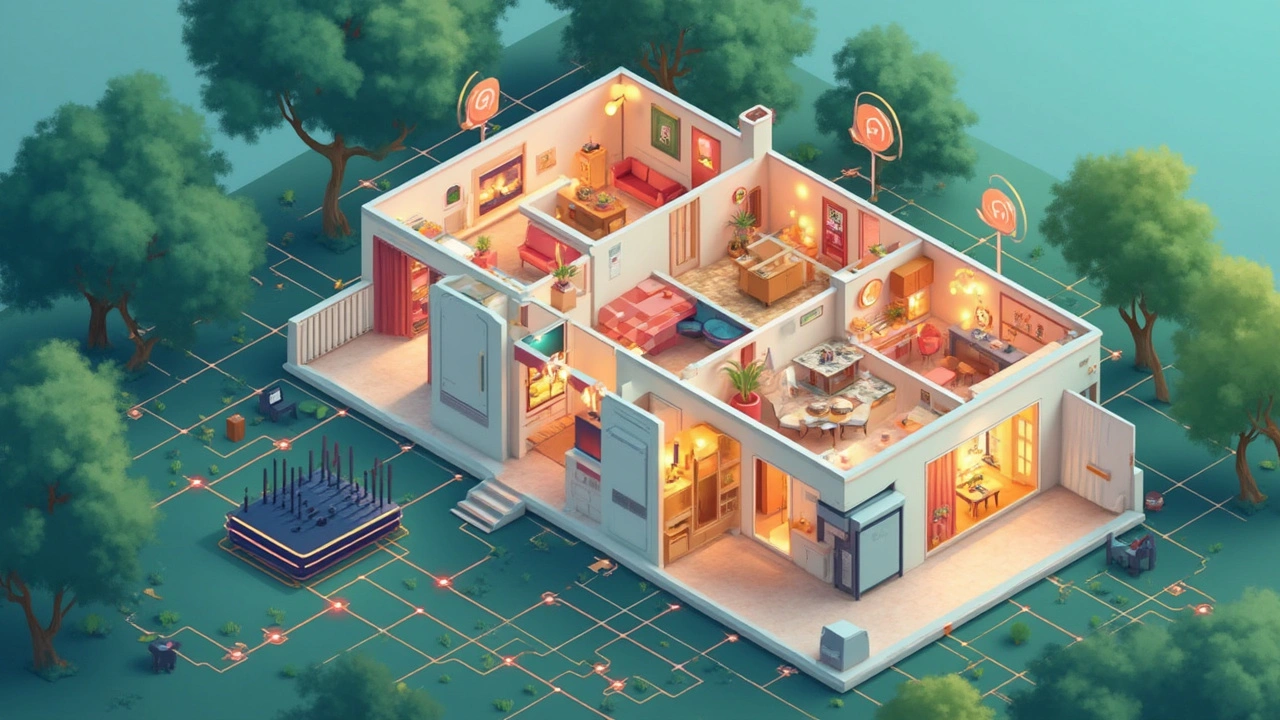If your lights, thermostat, and even your coffee maker are controlled by your phone, you’re probably wondering if your old WiFi box can keep up. Smart homes aren’t science fiction in Burlington anymore—they’re how we get chores done while sipping a double-double. But with everything needing WiFi, your router might feel like it's in a never-ending game of dodgeball, and it’s dropping balls every day. So, do you really need a "smart" or special router for a connected home, or is that just a tech company's way of making sure you buy new stuff every couple of years? The truth is way more interesting (and practical) than it seems.
How Smart Homes Push Regular Routers to the Limit
Think about your average evening: streaming a show, your robot vacuum is cleaning under the couch, your kids are gaming, your partner's on a video call, and you just asked Alexa to play your favorite playlist. That's a lot of data flying around—and every device in your home wants a bite of that WiFi pie. Regular routers were never built for this kind of traffic jam.
Have you ever noticed your WiFi drops or slows down right when you need it most? It's probably because your router can only handle so many gadgets chatting at once. Back in 2010, the average home had about five connected devices. Fast forward to 2025, the typical smart home in Canada easily juggles 25 or more devices, according to a 2024 survey by Canadian Tech Hub. That's everything from baby monitors to smart doorbells to fridges with built-in screens. Your router, if it's older or a basic model from your internet provider, could be a bottleneck—and that means lag, buffering, and sometimes those annoying "Device Not Detected" errors from your smart plugs.
Not every smart gadget uses the same amount of bandwidth. Streaming a movie in 4K or gaming online? Those hog a ton. But dozens of low-energy smart bulbs or sensors usually need just a drip of WiFi. Still, the real crunch is about how many devices your router can juggle at once, not just how much internet they use.
Here's a fun fact: many basic routers can only handle about 10 to 15 devices smoothly. Past that, you get random disconnects or devices dropping offline. That might have worked years ago, but with smart homes, we’ve blown past those numbers.
| Device | Data Use (approx) | WiFi Strain |
|---|---|---|
| Smart Light Bulb | Few MB per month | Low |
| Security Cam (HD) | 60-300 GB/month | Very High |
| Smart Speaker | 0.05-1 GB/month | Low-Medium |
| Streaming TV (4K) | 15-50 GB/hr | Very High |
| Robot Vacuum | Few MB/week | Minimal |
So, if your WiFi goes down just as someone rings the smart doorbell, your router might be waving a little white flag.

What Makes a Router “Smart-Home Ready”?
If you’ve strolled through Best Buy or clicked through Amazon and seen routers with futuristic fins and names like “AX6000 Tri-Band Smart-Mesh,” you might get the idea these boxes are made for rocket ships, not kitchens. Here’s the real checklist that matters for a smart home router—no sci-fi required.
- Device Capacity: This is how many gadgets can connect at once without the entire system grinding to a halt. Modern routers supporting at least 32 devices are your starting line. Some WiFi 6 (802.11ax) routers can comfortably handle 50 or more.
- Band Steering and Dual-/Tri-Band: Your old router probably only offered one frequency (2.4GHz). Now, 5GHz and even 6GHz are common on new routers, which helps separate traffic (like putting trucks on one highway and bikes on another so they don’t crash).
- Mesh Support: Large home? Lots of walls? Look for mesh systems like Google Nest WiFi or Eero. They use several "nodes" so your WiFi doesn’t fizzle out two rooms from the source.
- Quality of Service (QoS): This feature lets you prioritize critical devices—say, the smart camera at your front door gets priority over a forgotten tablet.
- Security: With smart homes, you’re inviting dozens of little digital windows into your network. Routers with built-in security tools, firmware auto-update, or even parental controls can stop bots or hackers in their tracks. WPA3 is the current gold standard for WiFi security.
- App Control: Modern routers come with slick smartphone apps for setup and troubleshooting. This is especially handy when Auntie Jean visits and can’t remember her email password for the guest network.
One weird tip? Some smart home devices still need 2.4GHz WiFi due to their basic chips. Fancy new routers give you separate "bands"—make sure the one you choose offers a real 2.4GHz channel, not just an auto-switching one. Setup can get wonky otherwise.
Here's a quick comparison of router types used in smart homes, based on reliability tests from the independent Canadian Consumer Network in March 2025:
| Router Type | Device Limit | Security Level | Best For... |
|---|---|---|---|
| ISP Basic Router (2020 or older) | 10-15 | Low-Medium | Small homes / No smart devices |
| Dual-Band WiFi 5 Router (2018-2024) | 20-32 | Medium | Condos / Basic smart setups |
| Mesh System, WiFi 6/6E (2022+) | 50+ | High | Large smart homes / Security needs |
If you’re paying over $70 a month for gigabit internet and still getting lag, your router is probably outdated, not your provider.

How to Decide If You Need to Upgrade (And What to Buy If You Do)
Before running out to buy the flashiest router your credit card will allow, pause and count. How many smart plugs, cameras, speakers—even those sneaky things like video doorbells—run in your house? Add up every phone, tablet, and TV, too. If it’s more than 15, you might already be pushing your current router’s max.
Do your lights stutter when you ask Google to dim them? Does your security camera go offline during hockey night? These aren’t just annoyances—they’re clues your current hardware can’t keep up. Tech support forums have a flood of posts from folks in Burlington (and elsewhere) running into "device dropouts" on basic Bell or Rogers routers once their smart homes really ramp up.
- Step 1: Map Your Home’s Tech — Make a list of everything that connects to WiFi. Yes, even that old Echo Dot in the basement.
- Step 2: Weird WiFi? — If devices vanish or streaming is choppy, your router is struggling. Try disconnecting a few things. If it helps, it's time for a new router.
- Step 3: Check Router Age — Routers older than 3-4 years? Consider “retiring” them. WiFi 6 is the new baseline (faster, better at juggling).
- Step 4: Security Worries — If your ISP-issued router updates only when you call tech support, it’s a digital ticking time bomb. Hackers don’t sleep.
- Step 5: Home Size — If you’ve got dead zones (bedroom WiFi is weaker than Burlington snow), a mesh system can fix that, fast.
If you hit three or more of those triggers, start shopping. There’s no single "smart home router" brand—aim for models that say WiFi 6, mesh, or support for over 32 devices. If you live in a cold, brick-heavy house like me, mesh routers are bliss. For condos, a high-end single-unit WiFi 6 router is plenty.
Don’t forget to set up guest networks for visitors and keep your smart home stuff on a separate WiFi name (SSID) from your computers and phones for an extra layer of security. That way, if a WiFi lightbulb ever gets hacked, it can’t roam through your emails.
One last stat: About 60% of Canadians with smart homes who upgraded to a mesh WiFi 6 system in 2024 reported "massively improved reliability," according to a Smart Home Lab study from last December. That’s not hype. It’s WiFi finally doing its job.
So, you don’t need a router that says "smart home" on the box. But you do need a modern router that keeps up with your gadgets, keeps your home safe, and doesn't make you curse every time your smart coffee maker fails before you’ve had your first sip. Trust me, I’ve been there.


Mbuyiselwa Cindi
July 18, 2025 AT 00:47Great topic, especially with the surge in smart home devices these days. It’s true, you don’t necessarily need a “special” router, but there are definitely key features you want to look for. Speed and range are non-negotiable since smart devices are scattered throughout the home.
Security is another huge factor. Many smart devices have vulnerabilities, so a router with strong security protocols and regular updates really helps keep the whole system safe.
Also, consider routers that support both 2.4GHz and 5GHz bands. Some smart devices only work on the 2.4GHz band, so dual-band routers are a must for compatibility. For future-proofing, WiFi 6 routers provide better device handling and faster speeds, perfect if you're adding more gadgets.
Budget should also be considered—sometimes mid-range routers offer the best balance between cost and performance without overpaying for features you might not use.
Overall, it’s less about a ‘special’ router and more about one that matches your home setup and device ecosystem well. Hope this helps!
Tasha Hernandez
July 20, 2025 AT 03:41Oh sure, just grab any ol’ router and enjoy all your fancy smart gadgets turning your home into a laggy, glitchy mess. That’s exactly what happens when people skimp on their WiFi setup—you get that delightful moment when your smart lights decide to throw a tantrum because they can’t connect.
Honestly, if you don’t get a decent router, you might as well talk to your toaster and hope it listens better than your internet.
Plus, security? Pfft. If your router is ancient, welcome to the party where hackers treat your home like their personal playground. But hey, who cares, right?
Invest in a robust router or don’t complain when your smart fridge acts like a dumb fridge.
Trust me, those Canadian WiFi tips aren’t just fluff—internet hardware really matters.
Henry Kelley
July 22, 2025 AT 12:07I gotta say, it really depends on your current setup. I mean, if you have a decent modem-router combo with good range, you might not need to upgrade dramatically. But if your smart home devices keep dropping off, that’s a clear sign your router sucks.
Also, placement is key. Sometimes just moving your router to a more central spot makes things way better without buying a special device.
Mesh networks are another option worth considering. They provide great coverage for larger or multi-story homes, which is something many people overlook.
Has anyone tried using a mesh system specifically for smart homes? Curious how well it handles multiple devices.
Nathan Pena
July 24, 2025 AT 20:34Let’s talk specs. Most people don’t realize how many smart devices flood the average home network now. Your basic consumer-grade router often simply can’t handle the workload without performance hits.
Another thing ignored is the firmware quality. Routers from reputable brands push vital security updates. Cheaper models might leave your network vulnerable.
So, a 'special' router, or at least a high-quality one with advanced QoS (Quality of Service) settings and WPA3 encryption, makes a tangible difference.
Otherwise, expect mediocre throughput, unprotected systems, and future headaches as more devices connect.
Krzysztof Lasocki
July 28, 2025 AT 03:14Haha, I loved the part about ‘special routers.’ I mean, yes, you don’t necessarily need a router that screams ‘smart home compatible’ on the box, but c’mon, everyone can tell when your WiFi is struggling. It’s like watching a toddler try to juggle.
But seriously, your standard router from five years ago might just not cut it anymore. So maybe not 'special' but definitely modern and equipped to handle a dozen devices all demanding streaming, commands, notifications, you name it.
And the Canadian market? Those tips are golden because the infrastructure and devices there push folks to be selective about routers more than other markets.
Also, mesh systems deserve a mention here. They save so many headaches.
What frustrates me is how manufacturers complicate it with fancy names rather than focusing on solid performance. Gimme simple reliability any day.
Patrick Bass
July 30, 2025 AT 14:27Interesting points made so far. I’d like to add that from a technical perspective, understanding your WiFi channels and avoiding interference is crucial. Many people overlook channel congestion in apartment complexes or dense urban areas which can severely impact device performance.
Configuring your router settings for optimal channel selection can be as effective as getting a new router.
However, if you do choose to upgrade, keeping an eye on routers that support MU-MIMO and OFDMA technologies can significantly improve multi-device performance, which smart homes definitely require.
Also, consider the router’s ability to be regularly updated to patch security flaws. Firmware that is no longer supported can become a liability in smart home setups.
So, in conclusion, while a special router per se is not an absolute necessity, certain technological features will greatly enhance your smart home experience.
Victoria Kingsbury
August 2, 2025 AT 01:41From a user perspective, I can confirm having a solid router has made all the difference in my smart home. For example, setting up VLANs in my router allows me to segregate IoT devices from my personal devices, which adds a layer of security and better traffic management.
This kind of setup may sound complex but many consumer routers now offer user-friendly interfaces for this purpose.
Moreover, many smart devices constantly talk to apps on your phone, so low latency and reliable connections are essential.
Security patches and parental controls also matter if you want peace of mind with connected devices in your household.
At the end of the day, you don’t need the fanciest router, but a well-configured, updated one with a few modern features can save you endless frustration.
Mike Marciniak
August 4, 2025 AT 12:54Honestly, I don’t trust any of these so-called ‘special routers.’ What guarantees do we have that these devices aren't secretly giving away data to third parties? With all the news about cyber intrusions, how safe are these routers that manufacturers claim are ‘smart home ready’?
Also, mesh networks? Sounds like a perfect way to multiply potential vulnerabilities. More nodes, more risk.
I’d advise anyone to double-check their router’s open ports and logs regularly, especially if you have smart home devices connected.
Just because a router has multiple antennas and high speeds doesn’t mean it’s safe or private. Security should be a bigger talking point.
Is there a trusted brand or model people swear by without reservations? Because I’m skeptical.
Sarah Meadows
August 7, 2025 AT 02:54As someone who’s very particular about tech sovereignty, I gotta emphasize buying routers that truly support privacy-oriented standards and adhere to strict security measures.
Many ‘special’ routers are just marketing tools, often produced by companies with questionable data policies. Canadians, in particular, should seek hardware that meets or exceeds national cybersecurity guidelines, not just flashy marketing claims.
DIY-savvy users might consider open source firmware routers like those supporting OpenWRT or DD-WRT for better control.
Smart homes are convenient, but they demand serious infrastructure and vigilance to avoid turning your privacy inside out.
So looking for routers with comprehensive encryption, secure update channels, and possibly VPN support should be a priority.
Christina Morgan
August 17, 2025 AT 00:47Hey all, just wanted to chime in as someone who has observed many smart home users struggle with connectivity. One important tip is to always check your router’s compatibility with the specific smart home ecosystem you’re using (like Google Home, Alexa, or Apple HomeKit).
Sometimes features like multicast or UPnP need to be enabled for devices to communicate properly. Not all routers handle this well out of the box.
Also, the router’s user interface matters. If it’s complicated or lacking customization options, most users won’t configure it properly, leading to performance issues.
And huge yes to the earlier mentions of mesh systems — they work wonders in bigger homes or places with lots of interference.
Finally, don’t overlook physical obstructions like walls or metal fixtures that affect WiFi signals.
Keeping devices' firmware updated and monitoring your network regularly can save headaches.